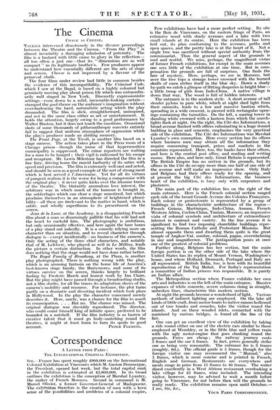The Cinema
CHALK AS CHEESE.
TALKIES intervened disastrously in the divorce proceedings between the Theatre and the Cinema. "From the Play" is almost invariably a damaging admission of paternity. The film is a bastard with little cause to glory in the reflection— all too often a just one—that its dimensions are as well compact " as its legitimate brother's. Few producers appear to understand how essentially different are the arts of stage and screen. Cheese is not improved by a flavour of the primeval chalk.
The four films under review had little in common besides the evidence of this incompatibility. The Criminal Code, which I saw at the Regal, is based on a highly coloured but genuinely moving play about prison life which was extraordin- arily well staged in New York. Discreetly expressionistic settings—even down to a solid, inexorable-looking curtain— stamped the gaol-theme on the audience's imagination without overshadowing the hard, naturalistic acting which the play demanded. The film is slick, straightforward, uninspired, and not in the same class either as art or entertainment. It holds the attention, largely owing to a good performance by Walter Huston, but it does not touch the emotions. Occasional shots of some thousands of pithecanthropic convicts entirely fail to suggest that uniform atmosphere of oppression which the play's producer made an abiding memory. The Front Page, at the Tivoli, is another film based on a stage success. The action takes place in the Press room of a Chicago prison—though the name of that hypersensitive municipality is suppressed. The crime reporters are waiting for a man to be hanged ; their vigil is enlivened by his escape and recapture. Mr. Lewis Milestone has directed the film in a fine fury, driving home the rancid barbarity of its satire with speed and precision. The film is extremely well cast and acted, and should be seen as a good example of the sort of strong meat which is best served a l'Americaine. Yet for all its virtues of pungent realism it is the worse for being a compromise with the original play ; it never quite kicks over the irksome traces of the theatre. The blatantly anomalous love interest, the arbitrary way in which much of the humour is brought in, the subterfuges which can clear a stage unnoticed, but which proclaim themselves in an atmosphere of heightened plausi- bility--all these arc irrelevant to the matter in hand, which is satire, and wholly superfluous to its presentment on the screen.
Jean de la Lune, at the Academy, is a disappointing French film about a man so disarmingly gullible that his wife had not the heart to cuckold him. The photography is ambitious, but only occasionally effective, and here again the bare bones of a play stand out nakedly. It is a comedy relying more on character than on situation, and to reveal character through dialogue is—except incidentally—no business of the camera's. Only the acting of the three chief characters, and notably that of M. Lefebvre, who played so well in Le Million, lends the picture a certain distinction. In other words, the film does nothing that the stage would not have done rather better.
The Royal Family of Broadway, at the Plaza, is another play photographed. There is nothing wrong with the play, which is an amusing fantasia on the home life of America's best-known stage family, the Barrymores, and some of its virtues survive on the screen, thanks largely to brilliant fooling by Frederic March and honest work by Ina Claire. But the play might have passed through a broadcasting studio, not a film studio, for all the traces its adaptation shows of the camera's mobility and resource. For instance, the plot turns partly on a dramatic and diverting incident which took place in Hollywood. In the play the character concerned merely describes it. Here, surely, was a chance for the film to assert its emancipation. . . . But no. The chance was missed. The original dialogue was slavishly reproduced. The director, who could count himself king of infinite space, preferred to be bounded in a nutshell. If the film industry is so barren of creative talent that it must go body-snatching round the theatres, it might at least learn to turn its spoils to good


















































 Previous page
Previous page